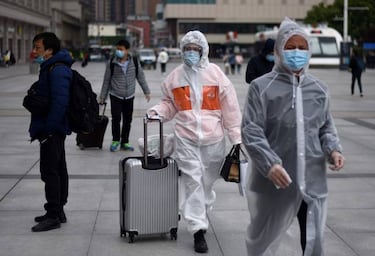Coronavirus: when was first case and when will pandemic end?
April 11 marks three months since the first confirmed Covid-19 fatality. There are now over 1.7m cases worldwide and more than 100,000 deaths due to the pandemic.

Saturday 11 April, 2020, marks exactly three months since the first coronavirus death was confirmed by Chinese authorities. The victim was a 61-year-old man living in Wuhan, who was a regular customer at the so-called "wet market" in the Chinese city of 11 million inhabitants where experts would later trace the origin of what would become known as Covid-19.
The health authorities had been monitoring developments in Wuhan since the end of December, 2019, when several cases had been registered but the true nature of the disease remained unknown. It was initially treated as pneumonia but within days researchers in China has identified a previously unknown mutation of the coronavirus - SARS-CoV2 - which ultimately causes Covid-19. However, at that time it was thought unlikely that it would become transferrable from human to human.
It quickly became apparent that the world was dealing with something more virulent than the Severe acute respiratory syndrome outbreak of the early 2000s (SARS-CoV1) and the Middle East respiratory syndrome-related coronavirus (MERS-CoV), which first emerged in 2012 and has now been reported in 21 different countries.
By contrast, Covid-19 has now spread to 201 countries and infected 1,709,593 worldwide (at time of writing), causing over 100,000 deaths.
That makes the current pandemic comparable to the H1N1 outbreak, which was declared a pandemic by the World Health Organization in 2009 and resulted in 18,500 confirmed deaths - although the total is estimated to be much higher.
WHO concerned over second wave of Covid-19
The #Lockdown21 is now officially extended.#LockdownExtended till April 30 in India.
— Amit Bhawani (@amitbhawani) April 11, 2020
The #coronavirus #Lockdownextention is for another two weeks. Waiting for Hon PM @narendramodi to announce the same.#COVID__19 #StayHome #coronavirusinindia #StayAtHome
More worringly, given the WHO's concern over a second wave of Covid-19 infections if lock down restrictions in place across the world are lifted prematurely, H1N1 has not gone away. There were localised outbreaks in Malta, Morocco, Iran in 2019.
Covid-19 continued to spread rapidly, first regionally and then globally. The first case in the USA, which is currently battling the peak of the pandemic, was reported in Washington State on 20 January when a man returning from Wuhan developed symptoms. The Chinese hub city was locked down three days later and on 30 January the WHO declared a global health emergency.
The first reported death outside China was confirmed in the Philippines on 2 February and the first in Europe was confirmed on Valentine's Day, 14 February, in Paris when an elderly Chinese man succumbed to Covid-19. Still, Europe and the wider world had little idea what was in store. By the beginning of April by some estimates 3.9 billion people, roughly half of the world's population, were under lock down restrictions of varying degrees.
On 19 March, good news emerged from China; it was the first day since the outbreak began that no new cases were reported in the country. However, there have been fresh cases since then, mainly from people returning home after a travel ban was eased. Wuhan's lock down was partially lifted on 8 April.
Researchers believe June could see pandemic under control

The Institute for Health Metrics and Evaluation (IHME) at the University of Washington has forecast that the worst of the pandemic will be over by June, predicting that 8 June will be the first day in Spain with no recorded Covid-19 deaths. That key date for the USA is predicted to be 14 June.
Related stories
Other research backs the WHO's fears of a second coronavirus wave. Doctor Zhang Wenhong, Head of the Covid-19 Committee in Shanghai, believes there is a "big possibility" that a new epidemic could start up before the winter. That theory was echoed by Doctor Hans Kluge, Regional Director for Europe at the WHO, who believes "there could be a second or even a third wave of coronavirus contagion."
Meanwhile, widespread reports state that wet markets in China are opening their doors again for business days after the lock down was lifted.

